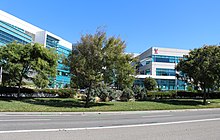Verily
 | |
 Headquarters in South San Francisco, California | |
| Formerly | Google Life Sciences |
|---|---|
| Type | Subsidiary |
| Industry | |
| Founded | December 7, 2015 |
Key people | Andrew Conrad (CEO) |
| Owner | Google Inc. (until 2015) Alphabet Inc. (2015–present) |
| Parent | Alphabet Inc. |
| Subsidiaries | Lift Labs |
| Website | verily |
Verily Life Sciences, also known as Verily (formerly Google Life Sciences[1][2]), is Alphabet Inc.'s research organization devoted to the study of life sciences. The organization was formerly a division of Google X, until August 10, 2015, when Sergey Brin announced that the organization would become an independent subsidiary of Alphabet Inc.[3] This restructuring process was completed on October 2, 2015. On December 7, 2015, Google Life Sciences was renamed Verily.[4][5]
Researchers[]
As of July 2014, members of the research team include Andrew Conrad, founder of LabCorp's National Genetics Institute; Vik Bajaj, an expert in nuclear magnetic resonance; Marija Pavlovic, who studies the effect of radiation on DNA; Alberto Vitari, a cancer biologist; Brian Otis, who worked on Google Venture's glucose-sensing contact lens;[6] and Mark DePristo, who worked on the at the Broad Institute.[7][1]
Acquisitions and funding[]
On 9 September 2014, the division acquired Lift Labs, the makers of Liftware.[8]
Verily Life Sciences in January 2019 raised $1 billion in funding. Andy Conrad remained CEO.[9]
At the end of 2019, Verily sold its stake in robot-assisted surgery joint venture Verb Surgical to development partner Johnson & Johnson .[10]
In August 2020, Verily announced that it is entering into the insurance market with the launch of Coefficient Insurance Company. The new subsidiary will be backed by Swiss Re Group's commercial insurance unit.[11]
Projects[]
- Develop comprehensive solutions that combine devices, software, medicine, and professional care to enable simple and intelligent disease management for people with diabetes, in partnership with Sanofi.[12]
- A spoon for people with tremors.[13]
- The Baseline Study, a project to collect genetic, molecular, and wearable device information from enough people to create a picture of what a healthy human should be.[14]
- A health-tracking wristband.[15]
- A disease-detecting nanoparticle platform[16] working with the wristband, a project called Tricorder.[17]
- Advancements in surgical robotics, in partnership with Johnson & Johnson.[18]
- Development and commercialization of bioelectronic medicines, in partnership with GlaxoSmithKline[19]
- Development of miniaturized continuous glucose monitors (CGM) in partnership with Dexcom[20]
- Contact lenses that allow people with diabetes to continually check their glucose levels using a non-intrusive method.[21] On November 16, 2018, Verily announced it discontinued this project.[22]
- Smart shoes for health tracking and fall detection[23]
See also[]
- Google X
- Calico
- Galvani Bioelectronics
References[]
- ^ a b "Archived copy". Archived from the original on September 18, 2015. Retrieved September 15, 2015.
{{cite web}}: CS1 maint: archived copy as title (link) - ^ Carey, Benedict. "Head of Mental Health Institute Leaving for Google Life Sciences". New York Times.
- ^ Brin, Sergey. "Google+ Post".
- ^ "Google Life Sciences debuts a new name, Verily". STAT. Retrieved 2015-12-07.
- ^ "Introducing Verily". YouTube. December 7, 2015. Retrieved December 24, 2017.
- ^ Barr, Alistair (Jul 25, 2014). "Meet the Google X Life Sciences Team". blogs.wsj.com. Retrieved 13 September 2014.
- ^ "Mark DePristo LinkedIn Profile". LinkedIn.
- ^ Chowdhry, Amit (10 September 2014). "Google Continues To Build Upon Its Life Sciences Ecosystem". forbes.com. Retrieved 13 September 2014.
- ^ Ron Leuty (January 3, 2019). "Google life sciences spinout Verily lines up $1B investment". . Retrieved January 5, 2019.
- ^ Hale, Conor (December 20, 2019). "Johnson & Johnson to take over Verb Surgical, its robotics venture with Verily". FierceBiotech.com. Archived from the original on January 8, 2020. Retrieved January 7, 2020.
- ^ Peters, Jay (2020-08-25). "Verily, Google's health-focused sister company, is getting into insurance". The Verge. Retrieved 2020-09-16.
- ^ "Sanofi and Verily Life Sciences Announce Launch of Onduo, a Joint Venture to Develop Comprehensive Diabetes Management Platform - Sep 12, 2016". news.sanofi.us. Retrieved 2018-08-16.
- ^ Rushe, Dominic (2014-11-25). "Google launches 'smart' spoon to help steady shaking hands". The Guardian. Retrieved 25 November 2014.
- ^ Kaiser, Jocelyn (28 July 2014). "Google X sets out to define healthy human | Science/AAAS | News". news.sciencemag.org. Retrieved 13 September 2014.
- ^ Chen, Caroline (23 June 2015). "Google Reveals Health-Tracking Wristband". Bloomberg. Retrieved 24 June 2015.
- ^ Gibbs, Samuel (29 October 2014). "Google is developing a cancer and heart attack-detecting pill". The Guardian. Retrieved 20 January 2015.
- ^ "'Silicon Valley arrogance'? Google misfires as it strives to turn Star Trek technology into reality". 6 June 2016.
- ^ Ackerman, Evan (3 March 2016). "Google and Johnson & Johnson Conjugate to Create Verb Surgical, Promise Fancy Medical Robots". IEEE Spectrum. Retrieved 3 March 2016.
- ^ Pandey, Avaneesh (1 August 2016). "GlaxoSmithKline (GSK) Teams Up With Alphabet (GOOGL) Subsidiary Verily To Make Bioelectronic Medicines". International Business Times. Retrieved 1 August 2016.
- ^ "Verily Life Sciences". verily.com. Retrieved 2017-02-15.
- ^ Brian Otis; Babak Parviz (2014-01-16). "Introducing our smart contact lens project". Google. Retrieved 2014-01-17.
- ^ Brian Otis (16 November 2018). "Update on our Smart Lens program with Alcon". Verily Blog. Retrieved 21 November 2018.
- ^ Li, Abner (1 February 2019). "Verily developing smart shoes for health and weight tracking, fall detection". 9to5Google. Retrieved 1 February 2019.
- Verily
- Alphabet Inc.
- Alphabet Inc. subsidiaries
- American medical research
- Biotechnology companies of the United States
- Life sciences industry
- Science and technology in the San Francisco Bay Area
- Transhumanist organizations
- Companies based in Silicon Valley
- Biotechnology companies established in 2015
- 2015 establishments in California